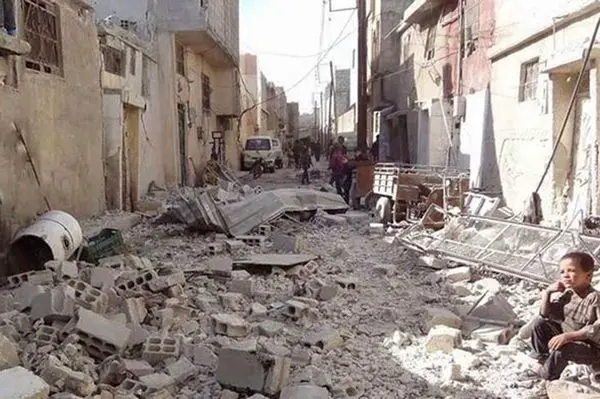A cease-fire covering part of Syria, based on an agreement between the United States and Russia, went into the third day on Monday, though it remained fragile amid allegations of breaches from different parties involved.
In the past two days, the cease-fire was largely observed. On Sunday, people strolled in bustling streets and visited busy market places in Damascus, the Syrian capital. Many described a relatively calm day with no notable incidents after almost five years of war.
"It's difficult to remember a calm night throughout the last four years, but yesterday (Saturday) was different," said a resident who gave his name as Ahmad. "Last night was so calm and this peaceful atmosphere has pushed people to go on streets today even though it's a weekend."
The landmark cease-fire involving the Syrian government, some 100 armed groups and other parties has been in effect since midnight Saturday. The cease-fire does not involved the Islamic State (IS), the al-Qaida affiliated Al Nusra Front and other militant groups designated as terrorist organizations by the UN Security Council.
The Syrian government and many rebel groups have said they will abide by the truce. However, there was no clear map about their locations.
Nevertheless, Staffan de Mistura, UN special envoy for Syria, said there will be surveillance mechanisms involving the operation centers of the United States, Russia and the United Nations. Information will be collected on any infringements and passed on to the United States and Russia and other parties so that cases of noncompliance can be addressed.
Russia and the United States can bomb any Syrian militant group that has expressed their unwillingness to observe the cease-fire, Russian Deputy Foreign Minister Mikhail Bogdanov said.
But it was not without incidents. A couple of mortar rounds slammed into the eastern part of Damascus and a retaliatory shelling from government side was reported. Despite that, Syrians who live on frontline areas near rebel-held areas described a relatively calm and tranquil night.
The High Negotiations Committee (HNC), the main opposition grouping, on Sunday lodged a formal complaint with the United Nations. In a letter to UN Secretary-General Ban Ki-moon, it accused the Syrian government and its allies of committing "24 violations with artillery shelling and five ground operations" in opposition-held areas.
Media reports also cited activists as saying anti-government rebels accused Russian planes of attacking several sites in northern Syria.
But some of the activists said that the targets of the strikes near Aleppo was the terrorist Al Nusra Front.
Russia has not confirmed the alleged strikes. Instead, it reported nine breaches of the truce, including from Turkish territory.
But Lt. Gen. Sergei Kuralenko, head of Russia's coordination center in Syria, told Russian news agencies that the cease-fire regime is being implemented on the whole.
The HNC also described the implementation of the cease-fire as positive.
De Mistura, the UN envoy, said that the cease-fire will remain a complicated, painstaking process and that in any cease-fire there are high chances that some hiccups could occur.
"The important point that we need to see is, if those incidents will be quickly brought under control and contained. That is going to be the test," he said.
De Mistura has said he plans for the peace talks involving various parties in Syria to resume on March 7 in Geneva if the cease-fire holds. The Geneva talks on the Syrian crisis collapsed earlier in February.
In a positive sign, the Russian Foreign Ministry said in a statement on Sunday that Russian Foreign Minister Sergei Lavrov exchanged views with his U.S. counterpart, John Kerry, on the implementation of the cease-fire and confirmed the importance of close military coordination.
The U.S. State Department said that the first line of monitoring compliance with the cease-fire will be the parties themselves. "Especially in the early days, these focal points will need to be in constant touch by email, phone and video conferencing," the RIA Novosti news agency quoted an official from the U.S. State Department as saying.
The official said that networks are being set up among all parties to be able to exchange information quickly.
Washington has said it was discussing a plan B in case the cease-fire is violated. But Moscow has ruled out any plan B.
Meanwhile, residents in Damascus said they are hoping for the cease-fire agreement to be honored.
"We have felt the tranquility and peace. We felt the old peace again, especially last night as we have slept without hearing the rattling sound of shelling echoing from Jobar, that feeling of fearlessness is great I hope it could last for a long time. I really wish if all the parties continue to honor (the cease-fire)," said a resident of Damascus who gave his name as Khitam.
 简体中文
简体中文

